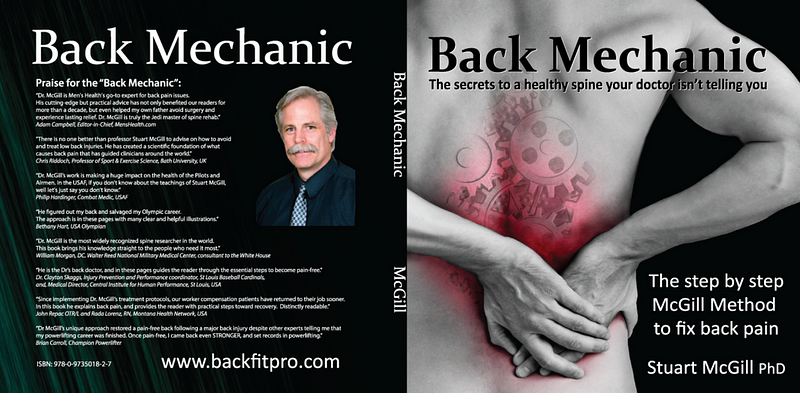Back Pain? Gain Back Your Life.
I’ve been experiencing lower back pain for years, and this year it reached a new all-time high.
The sort of pain that makes it hard to sit, stand, or bend — the sort of pain that makes it hard to spend time with your friends, cook, or do any of life’s myriad little joys.
But, the pain has started to improve. Very slowly, but noticeably, and that is due largely to the work of Dr. Stuart McGill.
McGill is widely considered to be the world’s foremost expert on back pain. And little wonder, with more than 240 peer-reviewed papers, three books (two of which are gold standards for clinicians), and more than three decades of hands-on experience treating patients at the clinic he created in Canada.
But it’s his book for the public, Back Mechanic: The Secrets to a healthy spine your doctor isn’t telling you, that’s slowly changing my life.
After owning this book for just one week, I noticed improvements in my condition. For three months, my doctor had been able to do nothing but prescribe pain medication. Physical therapists are hard to find even with good health insurance, so I had to rely on advice from the Internet. Only when I finally read McGill’s book did I realize how much of the advice out there for back pain sufferers is just plain wrong.
One of the most frustrating aspects of this whole process has been the absolute lack of knowledge from medical professionals I’ve seen about this condition!
My general physician, who is very kind, and very competent in their ability to be a nexus for treatment, has almost no in-depth experience with the issues that I face.
Their opinion, based on back imaging, was “degenerative disc disease” — it turns out that there is no such thing as “degenerative disc disease”. And yet, this is an incredibly common diagnosis. And it’s a dangerous diagnosis because it frequently leads desperate patients to seek out surgery.
During my research, I frequently encountered recommendations for surgery, especially if the condition failed to respond to stretching treatments, painkillers, and rest. I likewise encountered recommendations from medical professionals to focus on strength-building in my core and/or judicious daily practice of Pilates.
All of these recommendations are wrong.
Now, because I’ve spent a lot of time around pseudoscientific nonsense, I’m excessively careful about what I choose to accept as fact. In most things, I tend toward the overly cautious and allow experience and provable benefits to lead the way. Astrology, homeopathy, and energy healing aren’t going to solve the nerve pain in my spine. The problem is, neither is surgery.
It turns out that most people who have surgery end up with results nearly identical to those who did not have surgery.
As for “strengthening” the core muscles? This misunderstanding (along with misapplied training methods) is actually one of the causes of injuries. Pilates, likewise, can have benefits… but many of its principle movements cause the spine to move in ways it’s not designed to move — thereby causing (you guessed it) even more injury and pain.
Things get even more interesting when I look at McGill’s approach to the role anxiety and stress play in physical health:
Let’s establish this… we’re talking as though the psychological aspects and the physical aspects are distinct and separate, but they’re not. My good friend Professor Bill Marras at Ohio State University has done some wonderful work where he examined a person’s personality and then subjected them to job stress in an experiment. It involved real factory workers being stressed and getting yelled at by their boss, it sounds strange but this was the experiment. If workers had an anxious type of personality, for example, they contracted their muscles in a response to being yelled at. In other words, they unnecessarily loaded their joints as a response to the stress. Those who had a more confident personality did not experience elevated muscle contraction and did not load their joints.
Frustrated by the lack of medical support, anxious at the loss of my capacity to live a good life, stressed by constant aching and shooting pain — of course, I found it hard to recover. Not only was I doing the wrong things to treat my back, but my dour outlook was also both a product and cause of a spiraling cycle.
So, where do I stand now?
Well, the road to recovery is likely to be a fairly long one, but I’m appreciating the light at the end of this particular tunnel. Partly because I may be able to regain a pain-free life, and partly because I’m able to share this knowledge with others.
One important takeaway is: don’t accept professional opinions without doing your own research. Even well-meaning professionals with years of training aren’t going to know everything. But now, you might have knowledge that you can pass along to them so that they can better support you, and others, in the future.
Another is: don’t give up hope.
Progress in treating back pain is a matter of correcting lifelong bad habits of movement, and slowly building a renewed core foundation that can support your back’s health for years to come. Accept that your goal is a small amount of progress every day, don’t try to rush things, and focus on the big goal down the road: the day when you can go about your life pain-free.
BIO
Hi there! I’m Odin Halvorson, a librarian, independent scholar, film fanatic, fiction author, and tech enthusiast. If you like my work and want to support me, please consider subscribing!
References
An Interview with Professor Stuart McGill, The Back Mechanic | HFE Blog. (n.d.). HFE. Retrieved May 6, 2023, from https://www.hfe.co.uk/blog/discussing-back-pain-with-professor-stuart-mcgill/
McGill, S. (2017). Back mechanic: The secrets to a healthy spine your doctor isn’t telling you. Backfitpro Inc.
McGill, S. (2016). Low back disorders: Evidence-based prevention and rehabilitation (Third edition). Human Kinetics.

